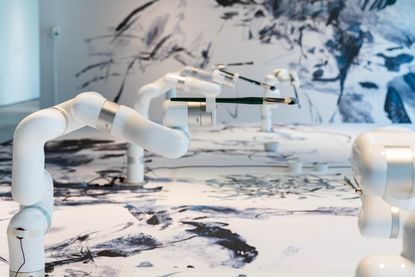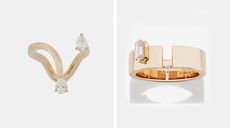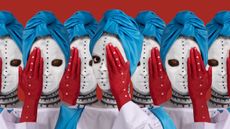Art, technology and nature intersect at Finland’s Espoo Museum of Modern Art
What is intelligence, where it can be found, and where it can go, asks Espoo Museum of Modern Art group show, featuring Rafael Lozano-Hemmer, Refik Anadol, Raimo Saarinen and more
- (opens in new tab)
- (opens in new tab)
- (opens in new tab)
- Sign up to our newsletter Newsletter

‘This show is not only about art and science, but about science that is partly real, partly speculative and partly imaginary,’ says curator Arja Miller of ‘In Search of the Present’ at Espoo Museum of Modern Art (EMMA) in southern Finland. She is standing in front of a paper bag tethered to a rope that is ‘breathing’ in and out. Entitled Last Breath, it’s a replica of the bag Finnish movie star Seela Sella breathes into, shown in an accompanying film, and is by Mexican-Canadian artist Rafael Lozano-Hemmer (whose participatory work honouring pandemic victims, A Crack in the Hourglass, An Ongoing Covid-19 Memorial, we featured in 2021).
The new work is disturbing, and will be even more so when 85-year-old Sella passes away, but Lozano-Hemmer sees this, and previous Last Breath editions in Ecuador, Canada, the US and Cuba as a ‘romantic attempt to capture the passing presence of a person’.

Seela Sella & Rafael Lozano-Hemmer: Last Breath, 2012, 2022
Lozano-Hemmer is one of 16 artists showing at ‘In Search of the Present’, the second of an ongoing series of exhibitions that began at EMMA in 2016. The show’s title refers to Finnish author Olavi Paavolainen’s 1929 essays on humanity in rapidly changing times, and all the artists explore the intersection between nature, technology and art.

Refik Anadol: Machine Hallucinations: Nature Dreams, 2021
‘I didn’t want it to be difficult to grasp. I wanted to create visual experiences that you don’t have to be an expert to understand,’ says Miller in front of an abstract film by Turkish artist Refik Anadol. A pioneer in the aesthetics of data and machine intelligence, Anadol fed 90 million images of landscapes into AI and allowed it to interpret them in its own unique way. It’s mind-blowing and hypnotising, and totally new. As Miller points out: ‘Anadol is creating art and images that we have never seen before because the tech didn’t exist.’

Raimo Saarinen: A Cross-Section of an Imaginary Slope, 2022
A landmark of brutalist architecture from the 1960s, EMMA lends itself perfectly to large, site-specific works, two of which were made for the show. Finnish artist Raimo Saarinen built a vertical slope covered in plants that has plastic drain pipes and tubing running through it. His point? That what we see and think of as natural may well not be, and that the imprint of humanity, even if it is hidden, is everywhere and has a huge impact on ecosystems. Earlier this year, Saarinen sent out a similar message with his concrete Floating Island, which looks ‘real’, despite being anchored off the shore of the Finnish town of Rauma.

Agnieszka Kurant: Post-Fordite no. 6, Post-Fordite no. 7 and Post-Fordite no. 8, 2020 –2022
Post-humanistic concerns – biometric surveillance, the power of algorithms, the co-existence of humans and other beings – are popular themes. Polish artist Agnieszka Kurant takes a speculative look at what geological formations might be left when we have consumed all the minerals on the planet and abandoned it for life elsewhere. Her Post-Fordite rocks are made from Fordite, a colourful by-product from Detroit’s car-making industry that looks like agate. The colourful fake ‘fossils’ represent the time when humans made cars.

Stephanie Dinkins: Conversations with Bina48: Fragments 7, 6, 5, 2, 2018
In a series of filmed conversations, American artist Stephanie Dinkins befriends Bina48, the first Black female robot, and together they try to make sense of consciousness, emotions, family and civil rights.
Chinese-born artist Sougwen Chung is a pioneer in human-machine collaboration, and in a new work, her family of robotic arms paint her stream of consciousness, recorded while she was meditating. The arms, holding paint brushes, make slow, human-like brushstrokes on paper, and remind viewers that tech doesn’t always have to be fast-paced and frenetic.

Sougwen Chung: Assembly Lines, 2022
‘All the artists in the show ask what intelligence is, where can it be found and where can it go,’ says Miller. And they’re not just talking AI, human and machine intelligence, but the intelligence of nature too. This is often hidden, misunderstood and underestimated. In the face of giant ecological challenges, this show hopes to change those perceptions.
‘In Search of the Present’, until 15 January 2023, Espoo Museum of Modern Art, emma.fi (opens in new tab)

Jakob Kudsk Steensen: RE-ANIMATED, 2018–19

Heather Dewey-Hagborg: Stranger Visions, 2013.

Stephanie Dinkins: Not the Only One, 2018

Anna Ridler: Mosaic Virus, 2019

Brandon Lipchik: paintings, 2019–21
Emma O'Kelly is a contributing editor at Wallpaper*. She joined the magazine on issue 4 as news editor and since since then has worked in full and part time roles across many editorial departments. She is a freelance journalist based in London and works for a range of titles from Condé Nast Traveller to The Telegraph. She is currently working on a book about Scandinavian sauna culture and is renovating a mid century house in the Italian Lakes.
-
 Aehra is Italy’s first all-electric luxury car brand. We preview its forthcoming SUV
Aehra is Italy’s first all-electric luxury car brand. We preview its forthcoming SUVAehra’s proposed electric SUV is brimming with cutting-edge technology. The Italian company hopes to shake up the high-end EV market in 2025
By Jonathan Bell • Published
-
 Alternative engagement rings with an edge
Alternative engagement rings with an edgeAs the sales of engagement rings sky-rocket during lockdown, enjoy our off-kilter curation of edgy and unconventional engagement rings
By Hannah Silver • Published
-
 ‘The Art of Advocacy’: Aïda Muluneh’s vivid photographs are forces for change
‘The Art of Advocacy’: Aïda Muluneh’s vivid photographs are forces for changeAt Efie Gallery, Dubai, Aïda Muluneh’s upcoming show, ‘The Art of Advocacy’ (12 January – 24 February 2023) surveys the photographer’s art as a tool for change, and debuts a new work, revealed exclusively here
By Harriet Lloyd-Smith • Published


